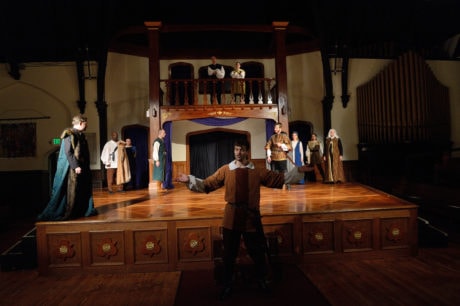King John of England was not a popular ruler, and Shakespeare’s play about him is not, to put it mildly, among his most popular works; indeed, it hasn’t been performed in Baltimore since 1781. The Baltimore Shakespeare Factory has committed to mounting the Bard’s entire canon over the next decade, however, and this play’s hour upon the stage has come again at last. Recognizing this as a once-in-a-lifetime opportunity, Director Tom Delise and his regal cast are giving it everything they’ve got, and the result will convince even the skeptics among us that King John, if not the monarch himself, has gotten a raw deal.

As you may recall from The Lion in Winter, King Henry II and his crafty queen, Eleanor of Aquitaine, squabbled over which of their three surviving sons would succeed him: Richard the Lionheart, Geoffrey, or John, the youngest but Eleanor’s favorite. Skip ahead a decade or so. Richard has died without a legitimate heir, and Geoffrey is also gone, leaving behind a son, Arthur, who is still only a boy. By right, Arthur is next in line, but John, backed by Eleanor, grabs the crown for himself, sparking a war with France, which supports Arthur and his doting but determined mother, Constance.
This is an all-too-real game of thrones, where loyalties are short-lived and slippery at best. Shakespeare underscores this moral confusion by having the characters repeatedly alter the meaning of a word to refute a point previously made, sometimes even by the speaker himself. In one particularly head-spinning example, the papal legate, Cardinal Pandulph, engages in a definitional bait-and-switch that stretches over forty lines, by the end of which we’ve begun to doubt whether language itself holds any truth any more.
Stuck in such a quagmire, we long for an honest hero, unassailable in both right and might. We could also use the relief of a jester, able to mock the pretensions and peccadilloes of all around him with impunity. And ideally, we’d be blessed with a wise man of conscience, who can gaze into the abyss of human nature without falling in, and who can ultimately lift us out.
The Bard brilliantly provides all three in the unlikely person of Philip Faulconbridge, who happens to be the illegitimate son of Richard the Lionheart, and thus is frequently called The Bastard, even when most of the other men onstage are far more deserving of that title. As played by BSF mainstay Chris Cotterman, he appears to be the antithesis of a kingly figure: ill-groomed, often ill-mannered, and unapologetic. Nevertheless, we quickly realize he’d be better at the job than any of the contenders, if only the law – and his own natural modesty and sense of duty – would permit it.
We first meet him in the midst of an inheritance dispute with his legitimate half-brother, which serves as a parody of the play’s larger conflict. The way he mercilessly yet good-naturedly teases his sibling proves we’re in the company of an expert comedian, capable of coaxing a smile out of the most recalcitrant audience. But he is no less compelling as the voice of moral authority, bluntly yet eloquently persuading nearly everyone he encounters to be a better person – or to meet his terrible swift sword if they refuse. In short, whenever Cotterman is onstage, we’re confident that both England and this play have found an unbeatable champion.
Portraying the title sovereign, Dean Carlson touchingly tries to establish a similar rapport with the audience, but it comes off feeling forced, just as the real John probably did to his subjects. Even his smile gives him away, since it reveals a missing tooth that seems to stand for all the other qualities he sadly lacks.
His most effective moment is ironically his most ignoble, when he attempts to shift the blame for one of his direct orders to Hubert, the servant obliged to carry it out, by claiming the vassal should have realized he wasn’t serious. What in other hands might be an insincere display of self-pity here becomes a tragic reminder of how John is repeating the mistakes of his father, whose reckless words once led to the assassination of his dearest friend, Thomas Becket.
As Arthur, Jessica Behar seems miscast at first. She’s clearly a good deal older than the boy is supposed to be, thereby undercutting the alleged reason for denying him the crown, and her efforts to act younger only make him seem like a painfully inept child, rather than the admirable innocent of the text. But in the end, Behar transforms Arthur into a poignant and authentic prince, courageous in the face of suffering and genuinely sweet even when his rhetoric threatens to become syrupy.

What’s more, with Anne Hammontree’s Constance in his corner, we wonder how he ever could have lost. This is one proud woman, and that pride is justified even when it verges on hubris. Shakespeare has her lament quite a bit, but even when Constance is at her most pitiful, Hammontree never allows her to be pathetic–instead defying the storms of fortune with a mighty typhoon of her own. At one point, even her closest ally accuses her of loving her grief more than her son. But Hammontree’s retort, though barely whispered this time, makes it plain that Constance is fittingly named: she is love incarnate, love that is spiritually if not physically stronger than an army of hypocrites–and that love will remain constant even beyond the grave.
The rest of the ensemble is scarcely less praiseworthy. Jean Miller brings such depth and shading to her brief turn as Eleanor that we wish we could see her tackle the role in The Lion in Winter. Grayson Owen is supremely smarmy as the Dauphin, Sian Edwards commands the stage as if by divine right as Pandulph, and as Hubert, Flynn Harne’s eyes, aptly enough, radiate a fine madness that can be hilarious or horrifying as required. Even Sarah Krempasky, arriving near the play’s end as John’s son, the future King Henry III, reassures us that if we can’t have The Bastard on the throne, young Henry will be the next best thing.
Don’t let this production pass into history without being a witness to it.
Running Time: Two hours and 20 minutes, with one intermission.
King John plays through August 19, 2018, at the Baltimore Shakespeare Factory, performing at The Great Hall at St. Mary’s – 3900 Roland Avenue, in Baltimore, MD. For tickets, purchase them at the door, or go online.




